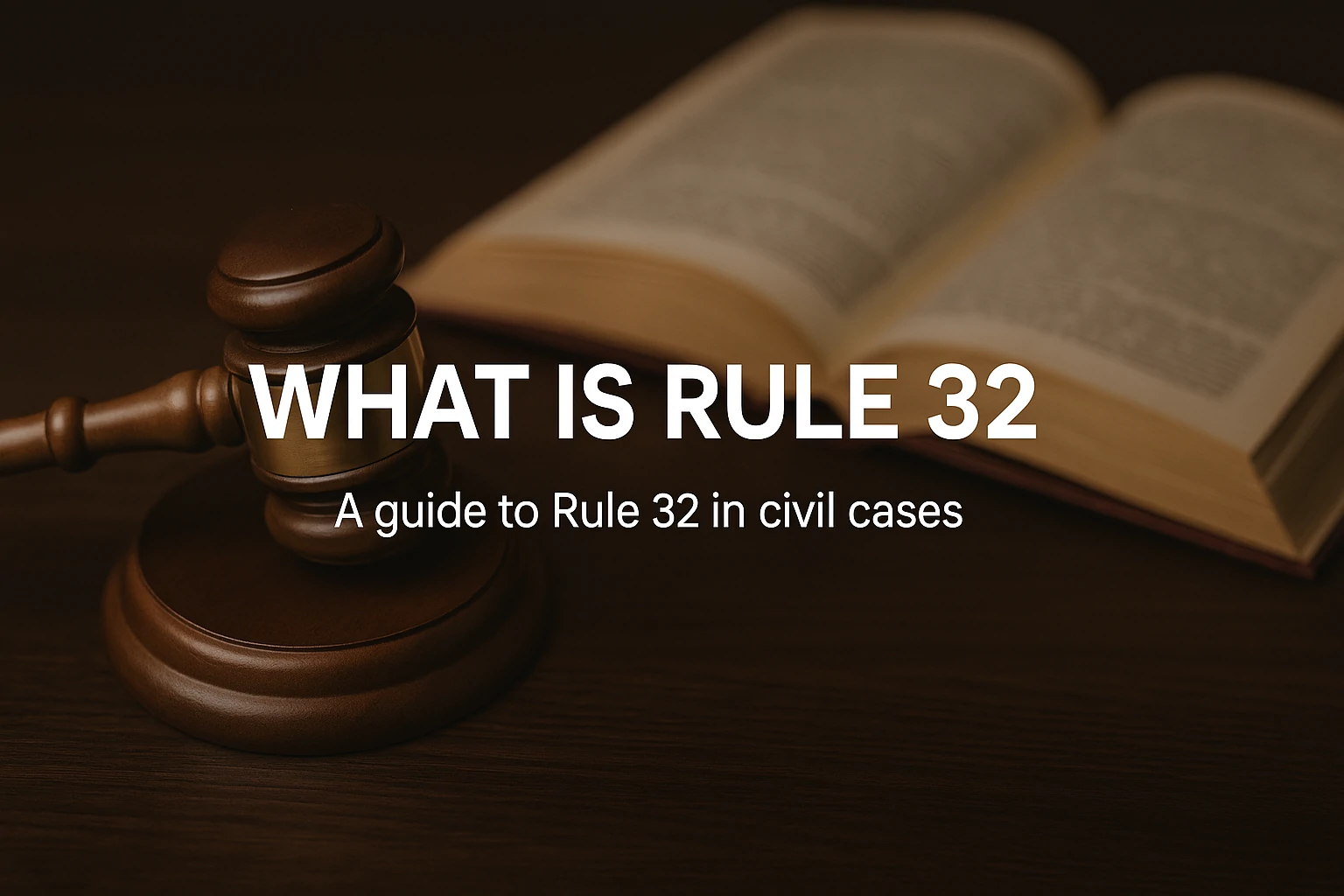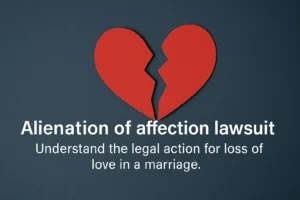Court rules often sound hard to follow. Many use formal terms that confuse people. Rule 32 is one of them. It shows up in civil cases and plays a key part in trials. Most people never hear about it unless they face a lawsuit.
Some think Rule 32 only matters in big legal battles. That idea is wrong. The rule applies in many cases, including car accidents, contract fights, and workplace claims. It deals with depositions. These are sworn statements made outside the courtroom.
Rule 32 explains when courts can use those statements. It keeps the process fair. It stops tricks and protects both sides. You do not need a law degree to understand it.
This article gives a clear guide to Rule 32. It shows what the rule says, how it works, and why it matters. If you are in court or want to learn how civil cases work, this guide is for you.
What Is Rule 32?
Rule 32 explains when a deposition can be used during trial. It sets limits. It gives both sides tools to challenge unfair statements. It also helps judges decide which testimony counts as proper evidence.
This rule is not just about paperwork. It can shape the outcome of a case. If used right, it can help prove facts or challenge false claims. If used wrong, it can backfire and damage a case.
What Is a Deposition?
A deposition takes place during the discovery stage of a civil case. Each side collects facts and builds a case. A lawyer may ask a witness to speak under oath. These sessions usually happen in a lawyer’s office. A court reporter records every word. Some sessions are also captured on video.
Depositions help both sides learn the truth. A witness may explain events, offer details, or correct false claims. Even if that person does not appear in court, their statement may still matter.
Rule 32 sets the rules. It tells the court when a deposition can be used at trial. Not all depositions reach the courtroom. Rule 32 explains when they can and when they cannot.
When Courts Allow Depositions at Trial
A court will not allow just any deposition to be read out loud. Rule 32 sets the rules. It gives a list of situations where a deposition can replace live testimony.
The most common reasons are simple. The witness may have died. They may be too sick to come. They may live far away—often more than 100 miles from the courthouse. They might be missing even after a good search. Or the lawyers on both sides may agree to use the deposition.
Rule 32 also allows part of a deposition if the person speaks in court but says something different. In that case, the lawyer can point out what the person said earlier. This helps show truth and catch lies. The court allows it because it is fair.
The rule helps keep trials honest. It allows facts to come forward, even if someone cannot be in court.
Who Can Object to a Deposition?
Lawyers have the right to object to a deposition. They can do this during the deposition or later in court. Rule 32 sets rules on how and when to object.
If a lawyer thinks a question was unfair, they must speak up. If they wait too long, they may lose the chance to challenge that part. Some objections must happen right away. Others can wait until the deposition is offered at trial.
The court looks at each objection and decides if it is valid. If the judge agrees, that part of the deposition may be removed. If not, the jury can hear it.
These objections help protect both sides. They make sure no one gets to use bad evidence or take advantage of confusion.
Using Depositions to Show the Truth
One of the key uses of Rule 32 is to expose lies. Lawyers use it to point out when someone changes their story. If a witness says one thing in court but something else in their deposition, Rule 32 allows the lawyer to bring it up.
This process is called impeachment. It shows the court that the witness is not reliable. Judges and juries take that seriously. A single change in a story may weaken a case.
Rule 32 lets lawyers read the old statement out loud. This helps compare both versions. It protects the record and keeps people honest.
Real-Life Example of Rule 32 in Action
Imagine a man injured in a car crash gives a full deposition before trial. He says how the crash happened and who was at fault. But weeks before the court date, his health gets worse. His doctor says he cannot leave the house. Rule 32 allows the court to hear his earlier statement. The jury still learns what he said, even though he can’t appear in person.
Now take another case. A business owner gives a deposition and says they never saw a certain contract. Later in court, they change their answer and say they saw it all along. The other side brings up the deposition. Rule 32 lets them do that. The judge may question the business owner’s truthfulness after hearing both answers.
These moments show how important Rule 32 can be. It gives the court access to what was said before. It holds people to their word.
Read about the statute of limitations in South Carolina before you file.
Is Rule 32 Used Everywhere?
Rule 32 is part of federal court rules. It applies to cases in federal civil court. But many state courts follow a similar rule. Some use the exact language. Others change parts of it. Still, the core idea remains: depositions can be used under clear rules.
Always check the court system where the case takes place. A state court may not follow Rule 32 word for word. A lawyer familiar with the local rules will know what applies. They will also know how to use the rule to help their client or stop abuse.
How Rule 32 Makes Court Work Better
This rule saves time. If a witness cannot come to court, the trial does not stop. The judge can allow their earlier statement. This keeps the case moving.
Rule 32 also saves money. Witness travel, delays, and schedule changes cost both sides. Depositions offer another path. Lawyers plan better when they know what each person already said.
It also makes things fair. Both sides can use depositions. Both sides can object. Rule 32 does not favor one party. It supports the truth. That helps courts stay just and clear.
Risks of Misusing Rule 32
Rule 32 is strict. If a lawyer tries to use a deposition in the wrong way, the judge may say no. If they break timing rules, the court may ignore the statement. If they skip key objections, they may lose their chance to challenge parts of the record.
Depositions must be taken and handled with care. Each answer may end up in court. Every word matters. Lawyers must know the rule inside and out. If they don’t, it may hurt their case.
A mistake with Rule 32 can lead to delays, lost evidence, or even lost trust from the judge or jury.
Advice If You Must Give a Deposition
If you must give a deposition, take it seriously. Every word you say will be recorded. Rule 32 may allow those words in court later. Your answers could affect the case long after the deposition ends.
Tell the truth. Speak in a clear voice. Ask questions if you feel confused. Do not guess. Say “I don’t know” if you are unsure. You can bring a lawyer with you. That lawyer can step in to protect your rights and stop unfair questions.
A strong deposition can help your case. A careless one can hurt it. Rule 32 gives those words power. Think before you speak. Always stay honest.
You can also talk to Benchill personal injury solicitors if your case involves injury.
Conclusion
Rule 32 may seem like a small part of court rules, but it plays a strong role in civil justice. It guides how courts handle deposition testimony. It gives a fair path when a witness cannot show up. It helps lawyers stay truthful. It also gives judges and juries better tools to decide a case.
Depositions matter in most civil lawsuits. Rule 32 makes sure they follow clear rules. This protects both sides. It keeps trials fair and smooth. It also stops false stories and unfair tactics.
Every court rule serves a purpose. Rule 32 protects truth. It brings structure to trials. It helps courts hear from people who may not appear in person. If you deal with a civil case, knowing this rule can help you stay prepared.
Disclaimer
This article gives general information, not legal advice. It does not create an attorney-client relationship. Court rules may vary and change over time. Speak with a licensed attorney for legal help with your case.




